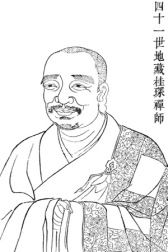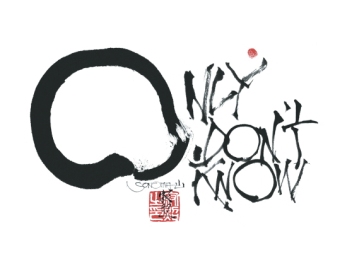"thinking & pondering a long time would tire the body. When the body is tired, the mind is disturbed; and a disturbed mind is far from collectedness."
My greatest difficulty in practice has been, for a long time now, my habit, my addiction, to thinking.�The reason this habit has become ingrained in my psyche, similarly to so many others in our western culture, is probably the common idea encapsulated by that famous Descartes adage, �I think therefore I am�. 
From the moment we start becoming self-aware as small children, and develop the amazing ability to use language to communicate, we also acquire the complimentary parasitic habit of narrating reality to ourselves. We constantly talk �to ourselves� internally, as if we�re reporting to some hidden headquarters, some sort of �HQ behind our eyes�, we could say.
Here�s one example I remember. A few weeks ago when visiting some friends, I came into a room where a selection of sweets was laid out on the table. I caught myself saying to myself, to my magical HQ, �oh good, there�s Oreo�s! I love those!� As I witnessed this internal monologue take place, it suddenly occurred to me, who is it that I�m telling? I�m right there, I can see the damn things with my own eyes! The monologue was completely redundant.
In his Discourse On The Two Sorts Of Thinking, the Buddha recounts that before he was enlightened, as he was meditating and paying attention to thoughts as the object of his meditation, he categorized all thinking �imbued with sensuality, thinking imbued with ill will,�& thinking imbued with harmfulness� as unwholesome, and noted that it �leads to my own affliction or to the affliction of others or to the affliction of both. It obstructs discernment, promotes vexation, & does not lead to Unbinding.� Whereas thinking �imbued with renunciation, thinking imbued with non-ill will, & thinking imbued with harmlessness� he categorized as wholesome, and said that it �leads neither to my own affliction, nor to the affliction of others, nor to the affliction of both. It fosters discernment, promotes lack of vexation, & leads to Unbinding.�
 However, the punchline of that discourse is what�s most interesting for our purposes here. Because as the Buddha was noticing that wholesome thinking has arisen in his mind, he realized that even �If I were to think & ponder in line with that even for a night� even for a day� even for a day & night, I do not envision any danger that would come from it,� and yet he adds, �except that thinking & pondering a long time would tire the body. When the body is tired, the mind is disturbed; and a disturbed mind is far from collectedness.�
However, the punchline of that discourse is what�s most interesting for our purposes here. Because as the Buddha was noticing that wholesome thinking has arisen in his mind, he realized that even �If I were to think & ponder in line with that even for a night� even for a day� even for a day & night, I do not envision any danger that would come from it,� and yet he adds, �except that thinking & pondering a long time would tire the body. When the body is tired, the mind is disturbed; and a disturbed mind is far from collectedness.�
So then, at this moment his practice takes a inspiringly logical turn, and he says, �So I steadied my mind right within, settled, unified, & focused it. Why is that? So that my mind would not be disturbed.�
And this is why I keep coming back to the realization that meditation is not a luxury. And it�s also not just a tool for Stress-Reduction or for any of the many other psycho-physical benefits that it can bring. Meditation is a basic necessity for a wholesome and good life. Just like knowing how to read and write, knowing how to tie your shoes, and knowing how to behave politely. It has to become something we learn as children and something that is considered fundamental and commonplace for all humans.
Because if you don�t know how to notice the content of your mind and how to act in accordance with what you find there, you are going to stay a slave to moods and stray thoughts. And anyone who�s experienced even a single moment of stillness of the mind, knows that the burden of being constantly lost in thought, forever carrying the million-ton backpack of ruminations and mental chatter, is the heaviest burden that one carries in this life. Putting it down, even for a single moment, is a relief unmatched by any other. Not to mention making a habit out of mental clarity, stillness, and the freedom to choose your reaction. But cultivating such a habit takes much more than just the perfection of meditation, so we�ll get to all that some other time.
In the meanwhile, to understand the incredible capacity of a mind freed from the slavery of uncontrollable thinking, here�s a story for you:
While on pilgrimage, Fa-yen stopped at Ti-tsang monastery as he was sidetracked by a snowstorm. The abbott there, known as Master Ti-tsang, asked Fa-yen, �Where are you going?�
Fa-yen said, �I�m going around on pilgrimage.�
Ti-tsang said, �What do you expect from your pilgrimage?�
Fa-yen said, �I don�t know.�
Ti-tsang said, �Not knowing is most intimate.�
At these words Fayan instantly experienced enlightenment.
Here, we are presented with an alternative to the egoic, grasping, incessantly thinking mind. A �Don�t-Know Mind�, or what my teacher Master Guohan calls, �Ordinary Mind of Non-Abiding Awareness�. But of course, our ego, ever the resourceful trickster, makes us fear this almost more than anything in the world. A moment of silence. So until we are able to manifest such a miracle, we can use a different trick to help us manage our thinking, one suggested by the wonderful teacher, Joseph Goldstein, who says that when we notice ourselves thinking about the same unfortunate thing for the umpteenth time, we can simply ask ourselves, �Is this useful?�
Perhaps one day we�ll be able to answer, �I really don�t know.�

Want to try meditation? Go Here.
If you enjoy the content on this website, you can support us by going here:�Support Us. You can also greatly help out by leaving a review on Facebook. Without your help, we wouldn�t be able to do this work. Thank you! Amituofo!










